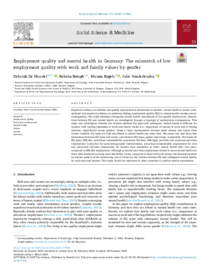Employment quality and mental health in Germany: The mismatch of low employment quality with work and family values by gender

De Moortel, Deborah ; Balogh, Rebeka ; Engels, Miriam ; Vanderleyden, Julie
2025
371
117906
quality of working life ; mental health ; gender ; precarious employment ; value system
Quality of working life
https://doi.org/10.1016/j.socscimed.2025.117906
English
Bibliogr.
"Empirical evidence on whether low-quality employment is detrimental to workers' mental health is mostly cross-sectional and empirical evidence on pathways linking employment quality (EQ) to mental health remains scarce. Consequently, this study examines subsequent mental health associations of low-quality employment. Associations between EQ and mental health are investigated through a typology of employment arrangements. This study also investigates whether the relation between EQ types and subsequent mental health is different for workers with varying intensities of work and family values (i.e., importance of success at work and of having children, respectively) across genders. Using a large representative German panel dataset and Latent Class Cluster Analysis, EQ types are built and linked to mental health two years later. We assess two- and three-way interactions between EQ types and values, and between EQ types, gender and values, respectively. We found six EQ types: SER-like, precarious unsustainable, precarious full-time, SER-light, portfolio and protected part-time employment. Controlled for socio-demographic characteristics, precarious unsustainable employment for men and precarious full-time employment for women were associated to lower mental health after two years, compared to SER-like employment. Although protected part-time employment related to worse mental health for those with moderate to strong work and family values, compared to those with mild values, the interactions show an unclear pattern of the moderating role of values for the relation between EQ and subsequent mental health, for both men and women. This study should be replicated in other countries to confirm similar associations."
This work is licensed under the terms of the Creative Commons Attribution 4.0 International License (http://creativecommons.org/licenses/by/4.0/).
Digital
The ETUI is co-funded by the European Union. Views and opinions expressed are however those of the author(s) only and do not necessarily reflect those of the European Union or the ETUI.